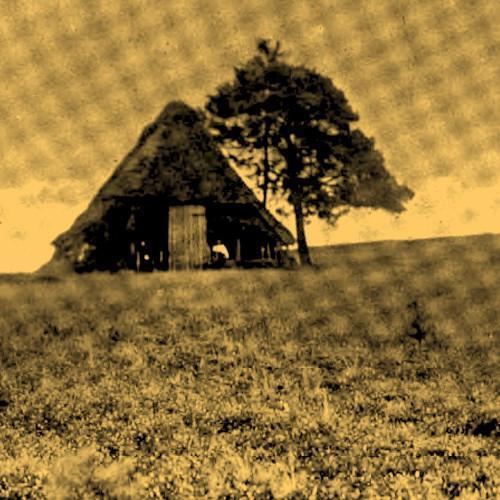• 304. Caroline to Wilhelm Schlegel in Berlin: Harburg, 4–5 April 1801 [*]
Harburg, 4 [–5] April [18]01
|90| My dear Schlegel, what a stupid joke you played, telling Emma you were writing to Luise without saying a word to me. For today I waited so longingly for letters; and I was so inconsolable when nothing but this bad piece of news arrived! And now nothing can come for 3 to 4 days yet, and I myself thus cannot be calm.
That quite aside, I am also nervously anxious about wandering about so utterly adrift here on the desolate banks of the Elbe, hearing about English flotillas and Danish military and advancing Prussians and Russians on the march. [1] Were we but all finally together!
But let me tell you about my journey here. On Sunday [2] I traveled to Celle alone with Rose. But I then had her return, since I would not be needing her here at all and since she would in any case only have made space tight, not least on the return trip. In Celle, the Dahmes received me with all their former cordiality, and the Böhmers, I would almost say, with renewed cordiality.
On Monday evening [3] my brother’s wife and her brother-in-law came to pick me up because Philipp was unable to come himself. My dear Wilhelm, what an extraordinarily charming little woman, quite pretty, quite good, a quite piquant, slender blonde full of vivacity and wit. He chose extremely well indeed.
We stayed in Celle through Tuesday [4] (where, I might add as an aside, Madam von Berlepsch had freshly disembarked from Caledonia) [5] |91| and then on Wednesday [6] we traveled all the way here, 12 miles [7] in a single day with the brother-in-law’s horses and extra team and other relais from Philipp’s good friends in the military, where we found Philipp longingly waiting for us, the good, upright man. He has become quite robust.
This haste was the best part of the journey, for heaven help us, what a countryside! I became seasick from the monotony of the heath and sky, since it is the same from Braunschweig all the way here, a single 18-mile stretch, [8] nothing but scraggy, brown heath, sand, stunted trees covered with moss and mold, every mile or so a village instead of a milepost appearing quite as if it had grown right out of the earth itself. [9]
Here, too, the shoreline is anything but beautiful, [10] and the view of Hamburg exists really only as an idea. I will see it up close the day after tomorrow. [11] This afternoon we heard cannon fire over in that direction; people are anxious about every sound here, as you might well imagine. —
This very moment, Philipp brought me the decisive news of the occupation of the Hannoverian territory, which George, it seems, did indeed sacrifice quite faithlessly after all. Let me say nothing more to you about the effect this news has had. When I was in Celle, people seemed to be thinking that this particular jest was still an impossibility. No doubt this will bring to an early grave some of those who were involved. Höpfner himself expired earlier. [12] — Prince Adolphus will immediately embark for England; I assume he will be taking Tatter along with him. [13]
My dear, please do write me often now. I am just so restless. I want to see whether I can have a change of disposition in Hamburg. Harburg is hopeless in that sense. As is the Elbe as well. I just feel as if I am way far up in the north somewhere. And what one hears here about the war is so barbaric compared to our romantic war scenes in Franconia. [14]
|92| Today I visited the sister of Superintendent Schlegel, who remembers dear Wilhelm with effusive tenderness, though that does nothing to relieve her insufferable personality. [15]
__________
Easter Day [5 April]
Schelling writes that Hardenberg is doing very poorly, and that Starke has given up on him. [16]
Try to stay healthy yourself, my friend, and let us see each other again soon. I basically am thinking of nothing but how I would like to get away from here as soon as possible. Circumstances may yet present various hindrances in that regard, since Philipp will not really be able to leave until the Prussians genuinely have occupied Haarburg.
My mother, by the way, is doing passably well. You sent Luise the kerchief a bit too late; although she had already bought herself one, she nonetheless, quite in keeping with her personality, kept the one you sent because you presented it to her as a gift, while I in the meantime am utterly lacking in that respect and only out of modesty did not ask for one for myself. Be so kind as to bring me one with you. Had you sent it to me, you would be spared having to do this now. [17]
It seems Friedrich and Madam Veit are not in Jena at the moment, at least that is what Winkelmann told Luise. Madam Veit is allegedly in Leipzig, Friedrich in Weissenfels. [18] What will happen now with my errand requests and with the keys? [19]
The way things are in Lower Saxony, both here and in Celle, goes without saying. People know nothing. They are especially curious about how writers find someone to pay them, and who on earth, e.g., reads Fichte’s books. Nothing but blind paganism, but without idols. —
In Celle they allegedly find Ramdohr’s Moralitäten boring. [20]
Ah, had I but some letters from you. |93| Not a single word for 14 days now. Is that fair? I think I, too, will simply quit writing for fear of constantly repeating this same old song. I am simply unable to strike any other tone now.
Stay well and from now on write as often as you can, even if only a few lines.
If I drown in the Elbe tomorrow, remember that today I sensed it would happen. [21]
Notes
[*] Harburg is located south of Hamburg across the Elbe River, Altona (where Caroline also stays) to the west (Rudolf Koch and Fritz Kredel, Deutschland und angrenzende Gebiete [Leipzig 1937]):

[1] Concerning the military background to Caroline’s remarks here and throughout this letter, see supplementary appendix 304.1. Back.
[2] 29 March 1801. Back.
[3] 30 March 1801. Back.
[4] 31 March 1801. Back.
[5] Caledonia, i.e., Scotland; Caroline is speaking literally. Emilie von Berlepsch traveled in Scotland between 1799 and 1800. Because she was a divorced woman, the journey created a certain measure of scandal in Weimar. Caroline’s statement here indicates she arrived back in Celle in March (or February?) 1801 (portrait: Österreichische Nationalbibliothek):
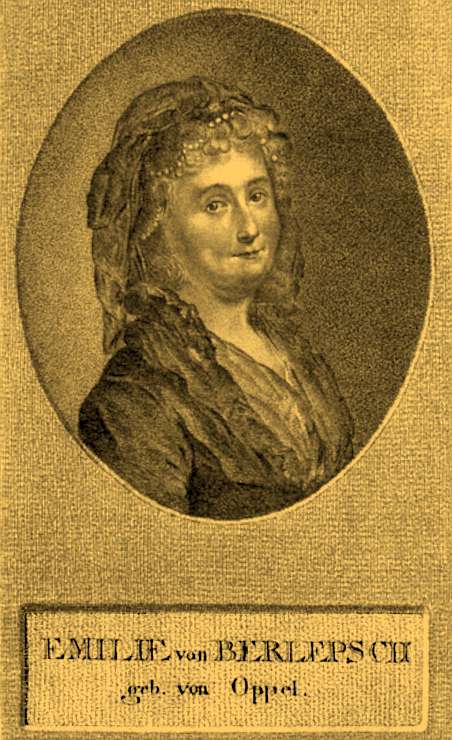
She eventually published a travelogue of the journey, with writing influenced by Ossian and Robert Burns, as Caledonia: von der Verfasserin der Sommerstunden, 3 vols. (Hamburg 1802–4). Emilie von Berlepsch soon (5 June 1801) remarried, namely, August Heinrich Ludwig Harms from Schwerin. Back.
[6] 1 April 1801. Back.
[7] I.e., 12 German miles, approx. 90–100 km. Back.
[8] I.e., 18 German miles, approx. 135–45 km. Back.
[9] The Lüneburg Heath covers a broad swath in northeast Lower Saxony, though heaths covered an even larger area until the early nineteenth century and, like the heath indicated below as being contiguous with the Lüneburg Heath, bore various names; here on a map of the earlier Duchy of Lüneburg from 1645, also showing Celle (Zell) and Harburg (Ducatus Luneburgensis adiacentiumque regionum delineatio, from Theatrum Orbis Terrarum, sive Atlas Novus in quo Tabulæ et Descriptiones Omnium Regionum, ed. Willem and Joan Blaeu [1645]):

Here Caroline’s postal-coach route from Braunschweig to Harburg (Post Karte Durch ganz Deutschland, ed. J. Walch [Augsburg 1795])

Here the Lüneburg Heath in a 1910 landscape oil by Arnold Lyongrün:

Given Caroline’s description, perhaps the following gallery of photographs provides a closer if less romantic approximation of the kind of roads she traveled and landscapes she saw on her way to Harburg. The photographs include roads and remnants/ruts of roads across the heath as well as other typical heath landscape features ca. 1900; click on the image to open the gallery:
[10] Harburg ca. 1824; Hamburg across the river in the distance (Haldenwang, after A. Radl, Ansicht von Haarburg; K. J. H. Hübbe, Ansichten der freien Hansestadt Hamburg und ihrer Umgebungen [Frankfurt 1824], plate following p. 8):

[11] Monday, 6 April 1801. Back.
[12] Uncertain allusion. Possibly Ludwig Julius Friedrich Höpfner (1743–1797), a professor of law in Giessen who was later involved in research into Hessian territorial law and statutes in Darmstadt and whom Goethe tried to recruit into Weimar service; if so, however, Caroline’s allusion is still wholly unclear. Back.
[13] Georg Tatter had accompanied Prince Augustus to Italy in 1793, when the latter married Lady Augusta Murray. On Tatter’s return in 1797, George III gave him a position with Prince Adolphus, with whom Tatter remained until he, Tatter, took a post in Petersburg as legation secretary with the envoy Count von Münster.
Caroline, however, is unaware that Tatter had arrived in Petersburg in November 1800 and was no longer in the service of Prince Adolphus. Back.
[14] Concerning the French in Bamberg, see Schelling’s letter to Wilhelm on 15 December 1800 (letter 276d), note 7. On 15 July 1800, with Moreau already at Munich, Austria concluded a ceasefire with him, albeit one unfavorable to Franconia. The French under Augereau had advanced as far as Frankfurt in July 1800 and were threatening Franconia but had not yet occupied it.
The ceasefire was lifted on 28 November 1800, and the war recommenced in these areas until yet another ceasefire was reached on 25 December 1800 in Steyer, and the Treaty of Lunéville came about on 9 February 1801. That is, Franconia had been subject to two ceasefires, sparing it an ongoing and intense military campaign. Back.
[15] Presumably a sister of Moritz Schlegel’s wife, Charlotte Schlegel, née Trummer, who was a native of Harburg; he would have called her “sister” as well after his marriage. Back.
[16] Friedrich von Hardenberg had already died on 25 March 1801; see Friedrich Schlegel’s letter to Wilhelm on 27 March 1801 (letter 303a).
Concerning his condition earlier in Dresden, see Charlotte Ernst’s letter to Wilhelm in January 1801 (letter 282a); concerning his treatment in Jena in the autumn of 1800 by Johann Christian Stark, see Dorothea Veit’s letter to Wilhelm on 23 September 1800 (letter 268a). Back.
[17] In her letter to Wilhelm on 1–2 March 1801 (letter 293), Caroline had made this request that Wilhelm “have some elegant female friend of yours pick out a kerchief for her soon, perhaps at Link and Schulz, made of pressed gauze or muslin or silk batiste in the latest fashion but costing no more than 5 rh.”
Caroline, however, is still writing from Harburg and has not yet seen the kerchief; once she was back with Luise in Celle and Braunschweig, she herself took a liking to the kerchief Wilhelm has sent. See her letter to Wilhelm on 20 April 1801 (letter 310). Back.
[18] Dorothea had gone to Leipzig to have new teeth made (Pierre Fauchard, Des Herrn Pierre Fauchard Frantzösischer Zahn-Artzt, Oder Tractat von den Zähnen: Worinnen die Mittel, selbige sauber und gesund zu erhalten, sie schöner zu machen, die verlohrne wieder zu ersetzen … gelehret werden [Berlin 1733], plate from vol. 2):

See Caroline’s letter to Wilhelm on 5–6 March 1801 (letter 296), note 31, with cross references. Friedrich was in Weissenfels to be at Hardenberg’s side, who died on 25 March 1801 (see above). Back.
[19] Caroline was trying to secure keys to the apartment in Jena from a certain Mademoiselle Faber in preparation for her return later in April; see her letter to Wilhelm on 5–6 March 1801 (letter 296). Friedrich and Dorothea had kept the keys while Caroline and Wilhelm were in Bamberg (see Dorothea’s letter to Wilhelm on 28 October 1800 [letter 273a]).
Caroline was, moreover, planning on Ludwig Tieck staying in the house — in fact, in Wilhelm’s room — during his anticipated trip to Jena (see her letter to Wilhelm on 26–27 March 1801 [letter 303]), something Friedrich found less than desirable, since he and Dorothea were on extremely strained terms with Caroline once she returned. See his letter to Wilhelm on 6 April 1801 (letter 304a). Back.
[20] Dorothea Veit had judged Friedrich Wilhelm Basilius von Ramdohr’s Moralische Erzählungen (Leipzig 1799) harshly in Athenaeum (1800) 238–43. While she does not dismiss the entire collections of stories, her critique is indeed severe at times. For excerpts see supplementary appendix 304.2. Back.
[21] Concerning Caroline’s earlier and slightly different view of such plunging “into the deep” (Werther) “amid the waves,” see the final lines of her letter to Lotte Michaelis on 28 March 1787 (letter 77): “Of all the various means of death, I like that amid the waves the best: ‘to end her sufferings in the broad embrace of death’,” presumably individually or on a grander scale ([1] Penelope: Taschenbuch für das Jahr 1815 der Häuslichkeit und Eintracht gewidmete; Inhaltsverzeichnis deutscher Almanache, Theodor Springmann Stiftung; [2] Johann Wilhelm Mail, Eine Frau stürzt sich in ein Gewässer [ca. 1783–1840]; Herzog August Bibliothek; Museums./Signatur Graph. A1: 2144; [3] Claude Joseph Vernet, Le Vaißeau Foudroye [ca. 1763–97]; Herzog Anton Ulrich-Museum; Museums./Signatur BANicolet AB 2.4):
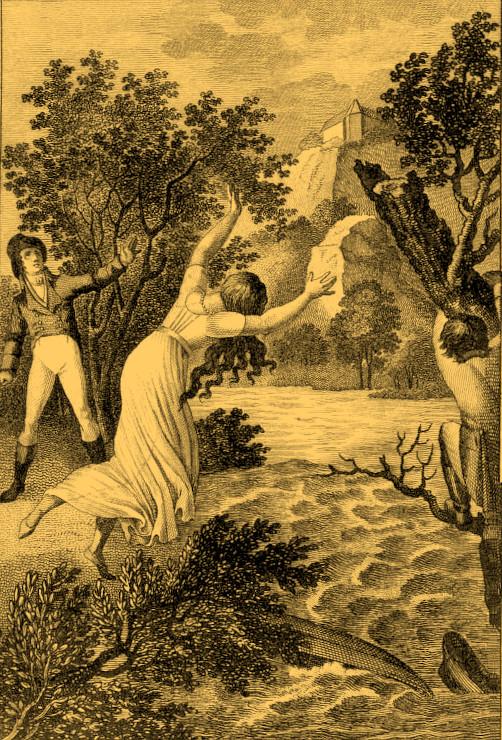


Caroline was in any case genuinely anticipating a ferry crossing from Harburg to Hamburg (and back), and for someone who had never been around a river quite as large as the Elbe at that locale (see note 10 above), the journey might indeed make her apprehensive (J. E. Gailer, Neuer Orbis Pictus für die Jugend oder Schauplatz der Natur, der Kunst und des Menschenlebens, 5th ed. [Reutlingen 1842], plate 133):
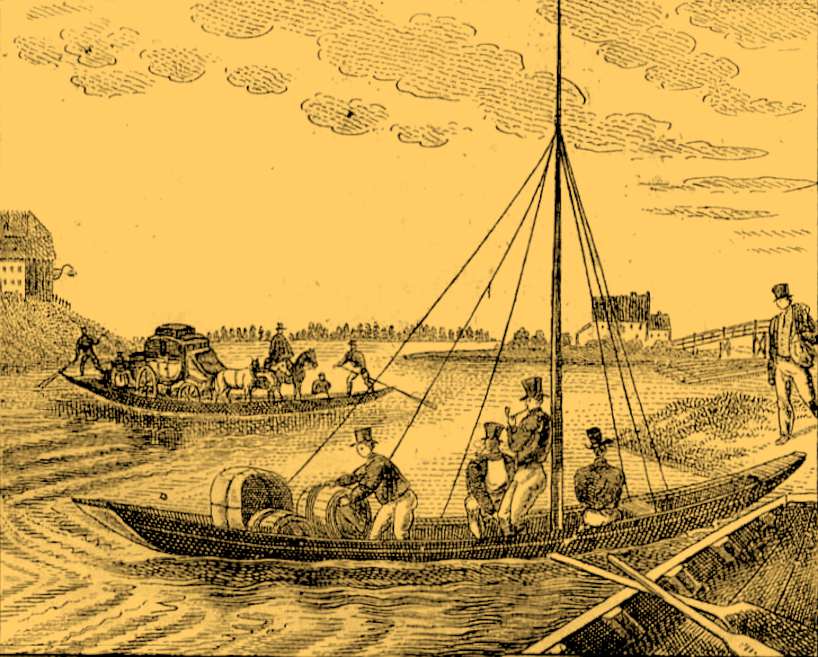
Here the ferry across the more modest Oder River as traversed by Daniel Nikolaus Chodowiecki in 1773 (Von Berlin nach Danzig: Eine Künstlerfahrt im Jahre 1773, von Daniel Chodowiecki. 108 Lichtdrucke nach den Originalen in der Staatl. Akademie der Künste in Berlin, mit erläuterndem Text und einer Einführung von Wolfgang von Oettingen [Leipzig 1923]):

Caroline would, moreover, presumably be traveling by carriage, as in the following illustration (excerpt from Christian Gottfried Morasch, Pillnitz an der Elbe bei Dresden [ca. 1810]; Sächsische Landesbibliothek – Staats- und Universitätsbibliothek Dresden):
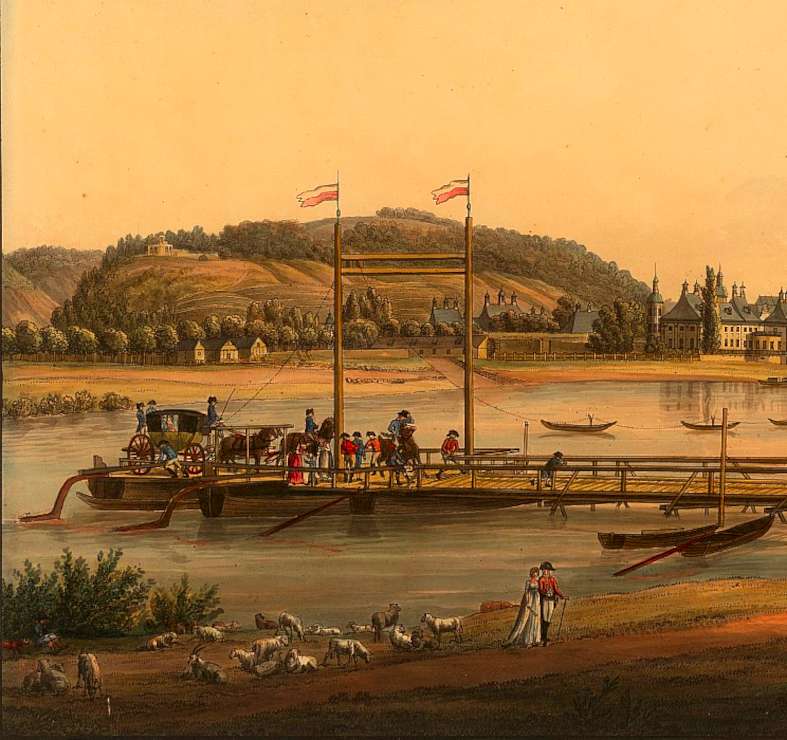
Finally, an otherwise unidentified river on which, just as Caroline fears, a ferry with a carriage gets into distress (Calendar für das Jahr 1803 [Offenbach]; Inhaltsverzeichnis deutscher Almanache, Theodor Springmann Stiftung):

Translation © 2015 Doug Stott

